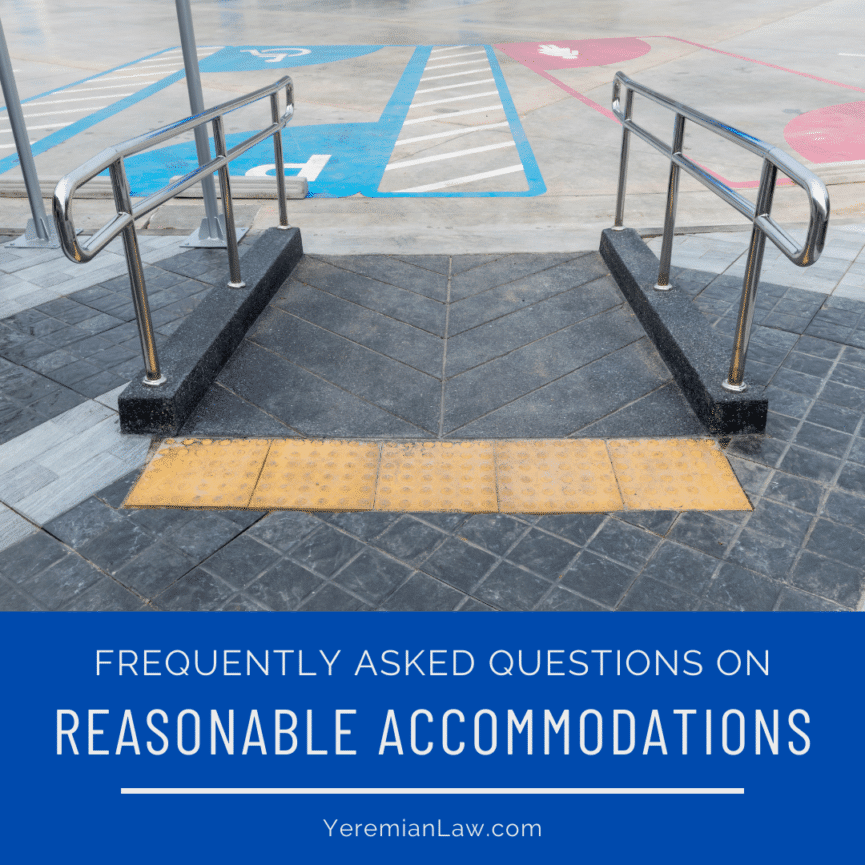Employers in California are required to make reasonable accommodations for workers – but what are they, and what are the most common? This guide explains.
What Are Reasonable Accommodations?
Under California law, employers that have five or more employees are required to make reasonable accommodations for job applicants and workers who need them due to disability. That means employers must make changes that improve accessibility when necessary – but only if those changes won’t pose an undue hardship to the employer.
An employer is required to make these accommodations if:
- It is aware of the disability
- The accommodation is reasonable
- The accommodation will enable the worker to perform their essential job functions (or enable an applicant to apply)
Related: Disability discrimination in the workplace
What Are “Undue Hardship” Cases in Which Employers Don’t Have to Make Accommodations?
If making an accommodation would result in undue hardship to the employer, the employer doesn’t have to do so. An undue hardship can mean logistical or financial challenges; if the applicant or employee’s request would cause an undue hardship, it’s an unreasonable accommodation.
Courts look at several factors when they’re trying to determine whether an accommodation would cause an undue hardship, including:
- How much it would cost the employer to make the accommodation
- Whether the employer can afford it
- What types of operations the employer performs
- The nature of the business (such as its size, structure and composition)
- How much the employer has already invested to make accommodations
- The size of the business
- Any other relevant factors
For example, it would be unreasonable to ask an employer to install an elevator in a rented building that it has no control over. However, it wouldn’t be unreasonable to ask an employer for an office on the first floor, or to move cubicles to make it possible for you to access yours with a wheelchair.
Common Examples of Reasonable Accommodations California Employers Must Make
Some of the most common accommodations that employers make include:
- Adjusting or modifying policies as necessary to accommodate a disability
- Eliminating non-essential functions from job descriptions
- Giving employees flexible work schedules when necessary
- Giving employees time off for doctor’s appointments or therapy
- Making facilities such as restrooms and break areas accessible
- Modifying equipment to accommodate medical conditions (or purchasing new equipment for the same purpose)
- Permitting employees to bring assistive animals to work
- Providing wheelchair accessibility, sign language interpreters or braille materials
This isn’t a complete list, either. There are several other types of accommodations employers may make to work with people who have disabilities.
Is Failure to Make Reasonable Accommodations Considered Discrimination?
Failure to make reasonable accommodations can be considered discrimination – but they key word there is reasonable. It is not discriminatory for an employer to refuse to make unreasonable accommodations (such as installing an elevator in a rented building). If an employer can’t make accommodations without undue hardship, it’s generally not considered discriminatory. Sometimes undue hardship boils down to money, and in other cases, it comes down to logistics (such as when an employer has the money to install an elevator, but it can’t because it doesn’t own the building).
Related: Is there anything you can do about disability discrimination at work?
How Do You Request a Reasonable Accommodation?
In some cases, employers are required to be proactive about providing accommodations. However, typically, employees have to make requests. You can do so by letting your employer know you have a disability, explaining how the disability interferes with you performing your job, and explaining the accommodations you need to perform the job’s essential functions. It’s always best to put your request in writing so you have a record of it – and you should keep copies along with records of when you submitted your request, too.
Can Your Employer Ask for Proof of Your Disability?
Your employer is allowed to ask for reasonable proof that you have a disability (if the disability is not obvious) when you ask for accommodations. If your employer asks for proof, you must be able to provide a list of the restrictions you face based on your disability. However, you do not need to provide your complete medical record to your employer; that’s going overboard.
What if Your Employer Won’t Make Reasonable Accommodations?
If your employer refuses to make reasonable accommodations – or accommodations that you believe are reasonable – there are several steps you can take. However, you may wish to speak to a Los Angeles workplace discrimination attorney about them. It’s a good idea to get a lawyer’s guidance before you file a claim or a complaint against your employer.
Do You Need to Talk to an Attorney About Reasonable Accommodations?
If you need to speak to an attorney about reasonable accommodations in your workplace, whether it’s because your employer has refused to make them or something else, we may be able to help you. Call our office at 818-230-8380 or fill out the form below to schedule your free consultation with an experienced, caring and committed attorney now.




